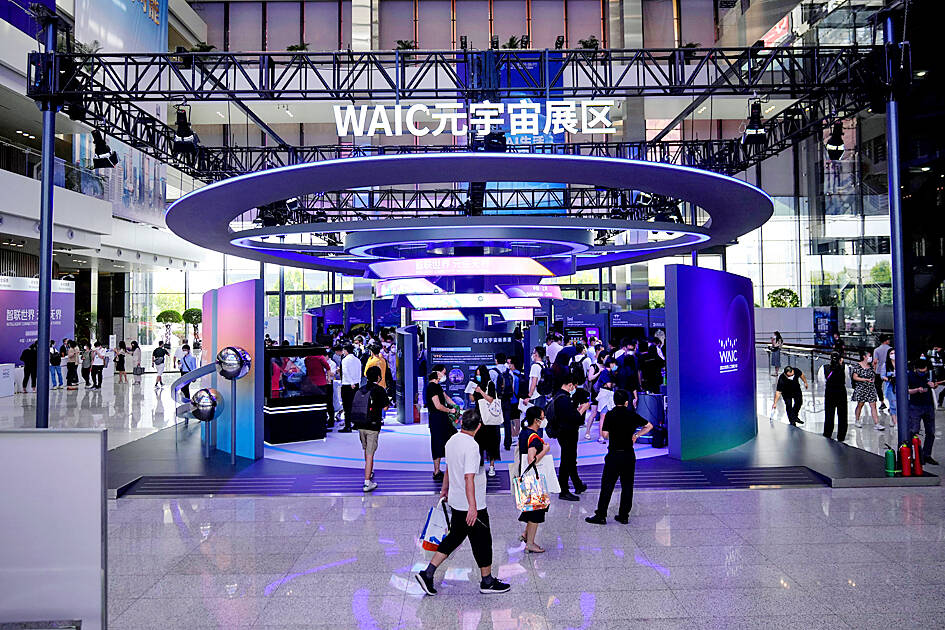US investors including the investment arms of Intel Corp and Qualcomm Inc accounted for nearly one-fifth of investments in Chinese artificial intelligence (AI) companies from 2015 to 2021, a report showed on Wednesday.
The document, released by CSET, a tech policy group at Georgetown University in Washington, comes amid growing scrutiny of US investments in AI, quantum and semiconductors, as US President Joe Biden’s administration prepares to unveil new restrictions on US funding of Chinese tech companies.
According to the report, 167 US investors took part in 401 transactions, or about 17 percent of the investments into Chinese AI companies in the period.

Photo: Reuters
Those transactions represented a total of US$40.2 billion in investment, or 37 percent of the total raised by Chinese AI companies in the six-year period.
It was not clear from the report, which pulled information from data provider Crunchbase, what percentage of the funding came from the US firms.
Qualcomm Ventures and Intel Capital were involved in 13 and 11 investments in Chinese AI companies respectively, outpaced by GGV Capital, which led US firms with 43 total investments in the sector, the data showed.
The Biden administration is expected to unveil an executive order this year curbing some US investments in sensitive Chinese tech industries as some lawmakers in Washington blame American investors for transferring capital and valuable know-how to Chinese tech companies that could help advance Beijing’s military capabilities.
According to the report, US investor GSR Ventures invested alongside China’s IFlytek Co (科大訊飛) in a Chinese AI company after the speech-recognition firm was added to a trade blacklist.
Silicon Valley Bank and Wanxiang American Healthcare Investments Group made investments in Chinese AI firms alongside China’s SenseTime Group Inc (商湯科技) before the powerhouse in facial recognition technology was added to the same blacklist.

SELL-OFF: Investors expect tariff-driven volatility as the local boarse reopens today, while analysts say government support and solid fundamentals would steady sentiment Local investors are bracing for a sharp market downturn today as the nation’s financial markets resume trading following a two-day closure for national holidays before the weekend, with sentiment rattled by US President Donald Trump’s sweeping tariff announcement. Trump’s unveiling of new “reciprocal tariffs” on Wednesday triggered a sell-off in global markets, with the FTSE Taiwan Index Futures — a benchmark for Taiwanese equities traded in Singapore — tumbling 9.2 percent over the past two sessions. Meanwhile, the American depositary receipts (ADRs) of Taiwan Semiconductor Manufacturing Co (TSMC, 台積電), the most heavily weighted stock on the TAIEX, plunged 13.8 percent in

A wave of stop-loss selling and panic selling hit Taiwan's stock market at its opening today, with the weighted index plunging 2,086 points — a drop of more than 9.7 percent — marking the largest intraday point and percentage loss on record. The index bottomed out at 19,212.02, while futures were locked limit-down, with more than 1,000 stocks hitting their daily drop limit. Three heavyweight stocks — Taiwan Semiconductor Manufacturing Co (TSMC, 台積電), Hon Hai Precision Industry Co (Foxconn, 鴻海精密) and MediaTek (聯發科) — hit their limit-down prices as soon as the market opened, falling to NT$848 (US$25.54), NT$138.5 and NT$1,295 respectively. TSMC's

ASML Holding NV, the sole producer of the most advanced machines used in semiconductor manufacturing, said geopolitical tensions are harming innovation a day after US President Donald Trump levied massive tariffs that promise to disrupt trade flows across the entire world. “Our industry has been built basically on the ability of people to work together, to innovate together,” ASML chief executive officer Christophe Fouquet said in a recorded message at a Thursday industry event in the Netherlands. Export controls and increasing geopolitical tensions challenge that collaboration, he said, without specifically addressing the new US tariffs. Tech executives in the EU, which is

In a small town in Paraguay, a showdown is brewing between traditional producers of yerba mate, a bitter herbal tea popular across South America, and miners of a shinier treasure: gold. A rush for the precious metal is pitting mate growers and indigenous groups against the expanding operations of small-scale miners who, until recently, were their neighbors, not nemeses. “They [the miners] have destroyed everything... The canals, springs, swamps,” said Vidal Britez, president of the Yerba Mate Producers’ Association of the town of Paso Yobai, about 210km east of capital Asuncion. “You can see the pollution from the dead fish.